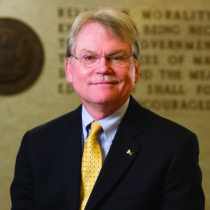Magazine

A Revolutionary Change
by Terrence J. McDonald, Director
On January 5, 1870, the University of Michigan Board of Regents passed the following anodyne resolution:
“Resolved, that the Board of Regents recognize the right of every resident of Michigan to the enjoyment of the privileges afforded by the University, and that no rule exists in any of the University statutes for the exclusion of any person from the University who possesses the requisite literary and moral qualifications.”
Its intentional vagueness notwithstanding, this was the revolutionary action that admitted women to the University. As a result, Madelon L. Stockwell of Kalamazoo was admitted to the “classical course” in the Literary College of the University on February 2 that same year. She would be the first woman admitted to the University of Michigan.
Coeducation was underway at U-M. In 2020, we will celebrate the 150th anniversary of this remarkable change.
The following fall, 34 more women were admitted: 11 in the Literary Department (predecessor of the College of LSA); three in the Department of Pharmacy; 18 in the Medical Department; and two in the Law Department.
By 1924, more than 7,000 women had attended every school and college in the University, making U-M one of the largest producers of female college graduates in the country. Some of these women became pioneer faculty in the all-female colleges in America. In those days, most coeducational institutions—including Michigan—generally refused to hire female faculty members.
But what was it like to be one of these female pioneers? Not always easy.
We know this because, in 1924, the Alumnae Council sent surveys to more than 7,000 women who had attended the University since 1870, as well as 3,500 then-current female students.
About 3,500 of these surveys still exist. The originals are held at the Bentley in the files of the University of Michigan Alumni Association.
To celebrate the anniversary of coeducation, the Bentley has partnered with the University Library to put the entire collection of the existing responses online. This collection contains both the original returned surveys—sometimes handwritten—and a transcribed version of each.
Because the alumnae were asked about both their experiences at Michigan and their lives after graduation, this collection is an unparalleled window into the lives of educated women in the time period. Their views of the University are both affectionate and sharp-edged.
Pioneering astronomer Mary Byrd from the class of 1878 was grateful for the way the University “deepened my devotion to genuine scholarship, opened up new vistas of study and investigation,” but recalled that “one of my keenest memories of college days at Ann Arbor is that the women students were unwelcome.”
Chicago doctor Bertha Van Hoosen praised “the delightful relation that existed in the literary class of ’84 in regard to the sexes,” but deplored the lack of female faculty: “As far as giving women a chance in the teaching faculty, the Univ. of Michigan is our Pseudo Mater and not our Alma Mater.”
And graduate student Isabel Brodrick praised the “cultural value of the advanced work offered,” but was “amazed to see the prevalence of the term ‘University Men’ in all appeals for University affairs, and wondered at the apparent monopoly on the part of men in University activities.”
Of course, these comments were all linked; it was in part the intellectual experience of the University that supported critical insights about its institutional culture. And therein is the lesson of this wonderful archive: Revolutionary institutional change can never really stop.
In the next calendar year, we will celebrate U-M opening its doors to women at the same time we re-commit to the ongoing transformation of the institution so that all are always welcome.
